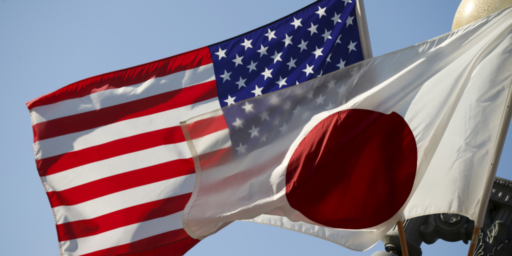JAPAN, INC.
Not all that long ago, politicos and intellectuals were arguing that we should do more to emulate Japan, with their incestuous relationship between government and business, since their model was obviously working so much better than our own. We don’t hear that much anymore, after a decade plus of stagnation in Japan’s economy. Even with a highly educated, motivated work force, Japan is still struggling to get out from under the weight of their old practices, as demonstrated by this piece: Waste Puts Japan on Road to Nowhere.
Hisashi Jonai, 70, spent decades tending his rice paddies in the shadow of Mount Fuji. During his backbreaking workdays, the grace of the snowcapped peak rising above his wood-framed farmhouse often caused him to pause, tilt his head toward the mountain and offer up an appreciative sigh.
But three months ago, his panoramic view of the dormant volcano known for centuries as the symbol of Japan was obscured by a newer and far less lovely symbol of this island nation: the pork barrel project.
Cranes, forklifts and cement mixers rolled onto the lush green slopes beyond his home, covering the horizon with the concrete beams of a new highway dubbed “the king of pork” by its critics. With a price tag of more than $83 billion — including decorative gratings and aluminum and stainless steel phone boxes costing $23,000 each — the new Daini Tomei freeway will run parallel to an existing highway where the traffic load has been steadily declining for the past three years.
“When I look at the foundation of that useless highway, I am crying inside at the waste,” Jonai said, pointing to the arching cement beams beyond his well-tended Japanese garden. “We have become trapped in a cycle of pork barrel. It is not just me. We are all paying the price.”
Daini Tomei is a prime example of what economists call one of the most significant problems confronting Japan as it seeks to emerge from its 13-year economic funk and enact broad structural reforms: an extraordinary culture of pork barrel politics.
As voters head to the polls in Sunday’s election, white elephants have taken center stage. Members of the newly formed opposition Democratic Party stand to gain seats in the national legislature, or Diet, in part on their pledge to slash public works spending by at least 30 percent.
Prime Minister Junichiro Koizumi, who rode to power in 2001 on a promise to cut the fat from government spending, is playing up his successes on the campaign trail — including a decrease in national public works payouts of some 14 percent.
While foreign economists chide Koizumi for not doing more, other observers here say that given the glacial pace of change in Japanese politics, Koizumi has accomplished far more than it appears. During the months leading up to the elections, for instance, he ousted powerful politicians from his ruling Liberal Democratic Party who were leading champions of the pork economy. His success renewed his image as a reformer with the public at a key time. Opinion polls show that he is likely to win a fresh mandate as prime minister on Sunday, which could give him a freer hand to enact real change.
But his legacy “will revolve around how he deals with the issue of pork barrel,” said Hideki Kato, president of the Japan Initiative, a think tank advocating broad reform. “And the one thing we know for sure is that he needs to do far more than he already has.”
Today, Japan spends about $208 billion a year on public works, according to government statistics, cushioning the blow of the recession by creating temporary jobs and fleeting economic stimulus. But that policy is burying Japan under record levels of debt and hampering a long-term recovery in the world’s second-largest economy.
The spending has been so excessive that the national debt now tops $6.4 trillion. In the industrialized world, that makes Japan the most heavily indebted nation as a percentage of gross domestic product. Fearing the debt is growing too unwieldy for even a country as rich as Japan, Moody’s Investors Service, a leading Wall Street bond rating house, has lowered the rating on Japanese bonds to below that of Botswana.
Analysts say the wasteful spending has sponged government funds away from other catalysts of growth — such as research and technology. The costs of the debt have been obscured by Japan’s deflation and its ultra-low interest rates. But if interest rates rise again, the debt service expenses will balloon. The rising debt is a formidable burden for younger generations, which must also shoulder the pension costs of the rapidly graying population. And it has led Japanese households, already conscientious savers, to stash away even more to prepare for the future.
“The situation in Japan has become too excessive. You cannot have a country that spends billions on useless projects and expect it to last forever,” said Takahira Ogawa, a director of sovereign ratings at Standard & Poor’s Corp., another rating agency. “The building has got to stop.”




